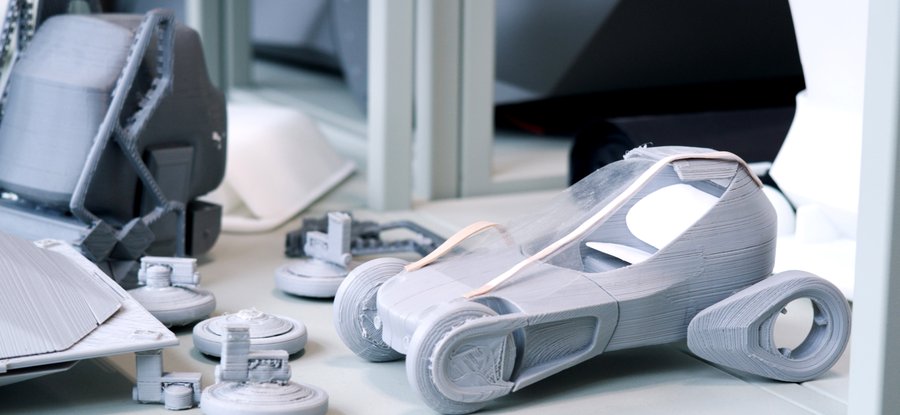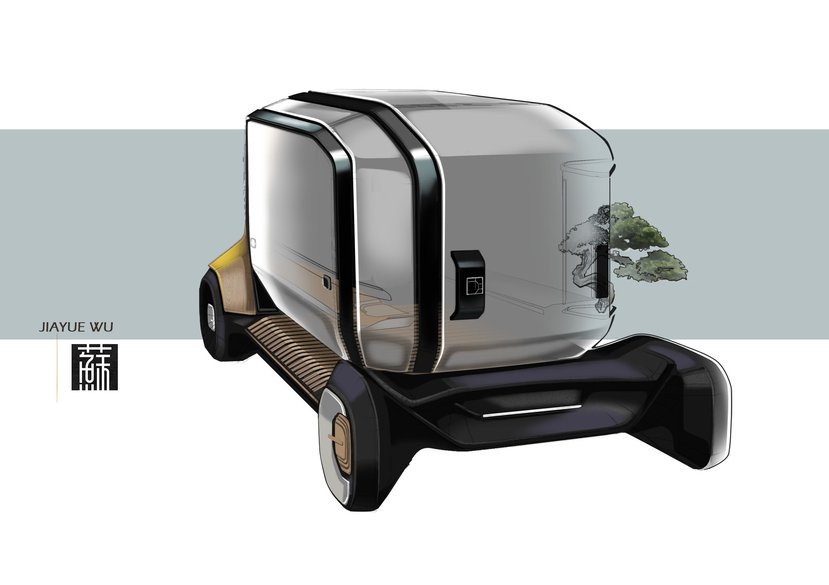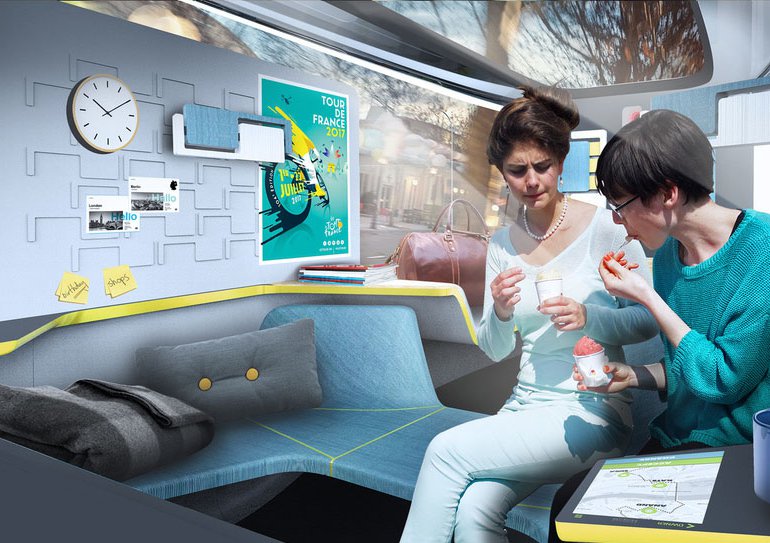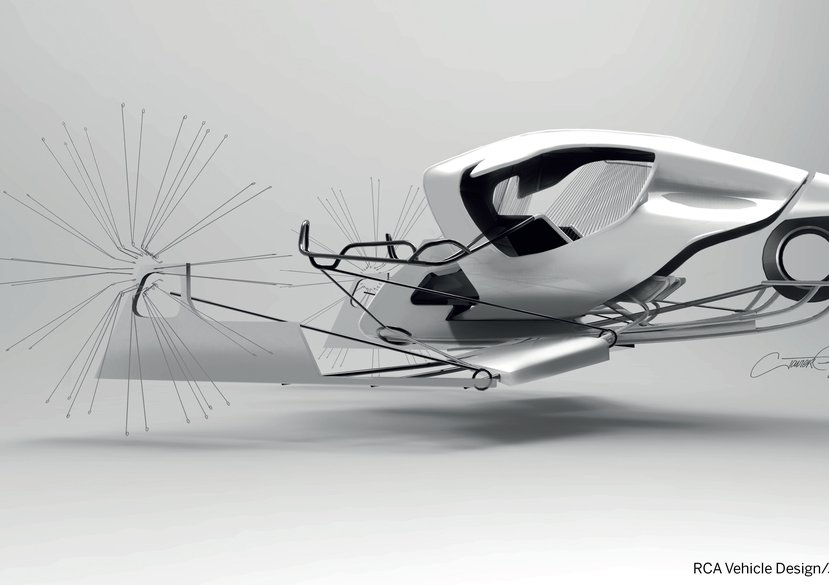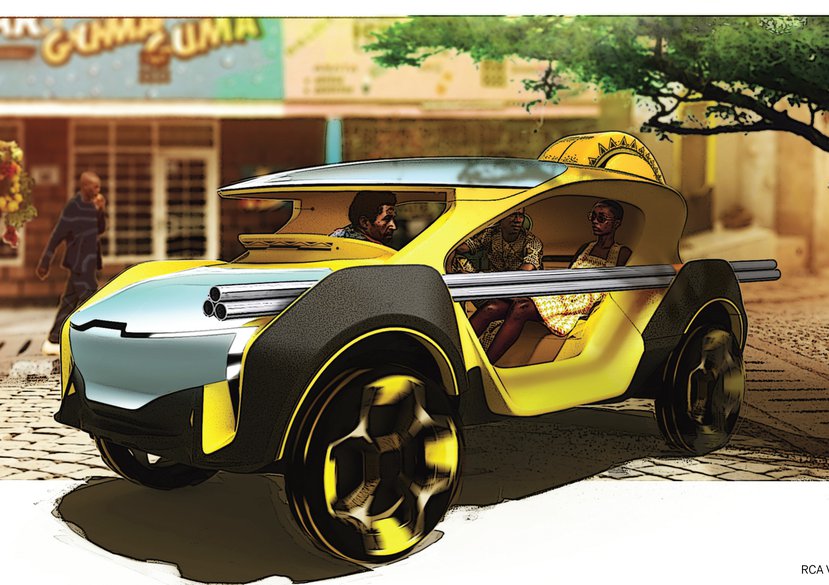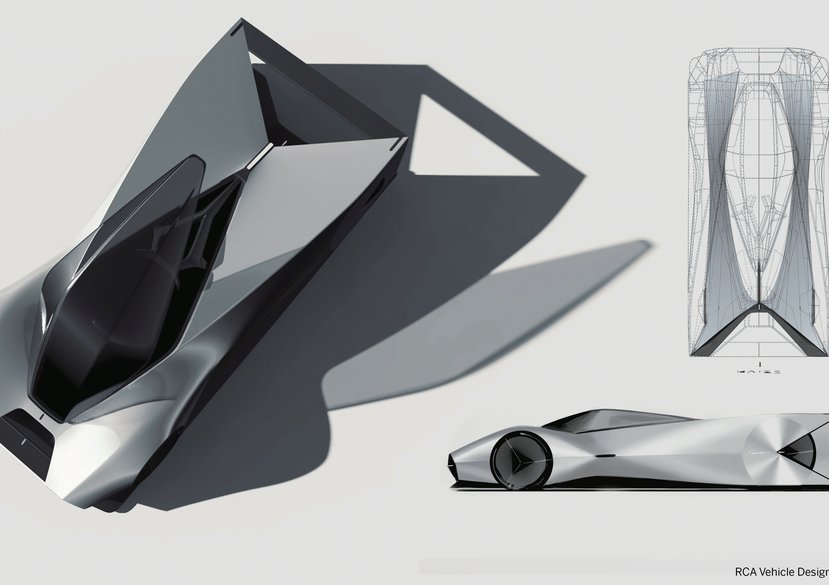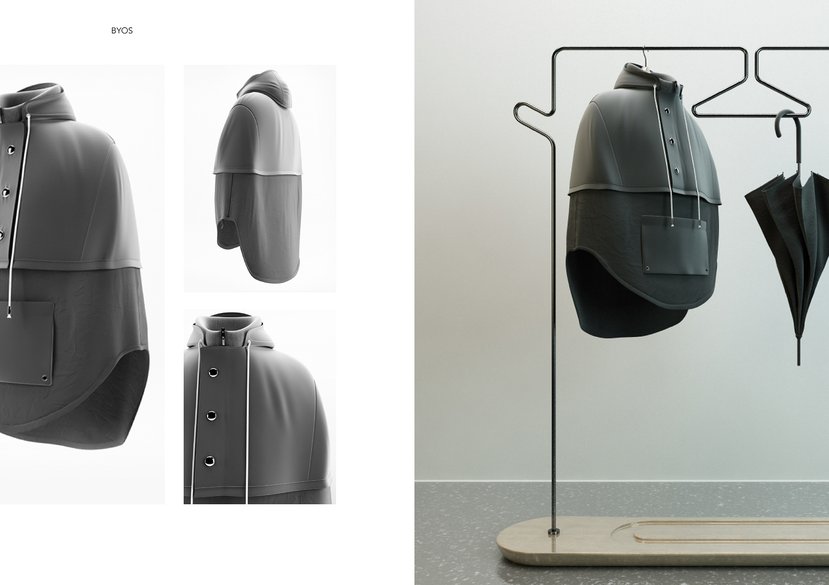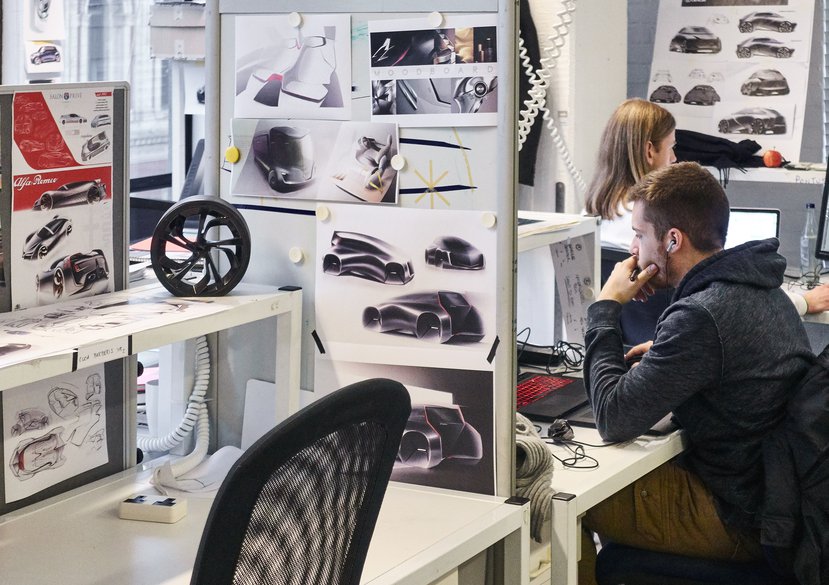
Overview
The future of mobility
Key details
- 180 credits
- 1 year programme
- Full-time study
School or Centre
Location
- Battersea
Next open event
- 2 Jul 2024
- Join Online Information Session
Application deadline
- 14 Aug 2024
Creating design leaders with the skills to influence.
Intelligent Mobility builds on the rich history of vehicle design at the RCA, placing this within the context of emerging social, cultural and technical changes. These include the shift to autonomous systems, renewable power, demographic changes and the increasing synthesis between man and machine. The programme defines and describes a paradigm shift that combines existing fields with a design-led approach that addresses both physical and virtual aspects of the mobility space as an integrated whole.
We equip you to deliver critical solutions to holistic mobility needs and issues. Our core approach is translating techno-cultural challenges via intense creativity and research – building mature design and innovation propositions to meet new mobility opportunities. You will work closely with mobility design practitioners, thought leaders and leading brands to ensure you have a thorough understanding of the industrial practice and the opportunity to engage and influence critical questions relating to business, production and new ownership and use models.
Our commercial, connected approach creates leaders within the ‘third age’ of automotive and mobility design and the broad spectrum of mobility services and artefacts.
Take your place among a new generation of designers. Develop the skill set and mindset to operate as a strategic leader with a broad range of abilities and insight about your own ‘point-of-impact’ on an increasingly diverse industry.
Applications for the September 2024 intake are open and will be assessed on a rolling basis. Programmes will close for applications when the maximum number of places have been awarded, or at the final deadline on 14 August, 12 noon (UK time).
Visit our student exhibitions
In July 2023, students presented a series of exhibitions and events featuring their final work. Explore online at the RCA2023 website.
You can also view previous events and exhibitions online at Showcase.
Find out more about this programme
Register for the Intelligent Mobility MA - Online Information Session on Tuesday 2 July.
Catch the replays from our latest online Open Day.
Gallery
Staff
Facilities
The School of Design is based across our Battersea and Kensington sites.
View all facilitiesStudents have access to the College’s workshops, with traditional facilities for woodworking, metalworking, plastics and resins, including bookable bench spaces. Computer-driven subtractive milling equipment is available, as well as additive rapid prototyping.
Our alumni
Our alumni form an international network of creative individuals who have shaped and continue to shape the world. Click on each name to find out more.
Where will the RCA take you?More details on what you'll study.
Find out what you'll cover in this programme.
What you'll cover
How will I learn?
There will be several opportunities to collaborate with others, but at a minimum, your programme will include 247.5 contact hours and 1552.5 independent study hours.
Contact hours can consist of lectures, seminars, tutorials, critical forums and workshops, among other types of teaching delivery. Teaching types included in your programme can consist of briefings, projects, tutorials, seminars, lectures, critical forums, technical inductions, technical workshops, offsite visits and blended learning. Y
Programme structure
Term 1
People and places (15 credits) provides a framework to understand how and where future mobility fits into a changing global landscape and how people and place connect through mobility. The unit aims to sensitise you to the scope and limits of different mobility typologies within the mobility mix. It highlights the need for design to meet broader infrastructural and social requirements.
Humanising technology (30 credits) explores how recent transformational mobility technologies such as autonomy and electrification can be interpreted to provide new and desirable human interactions in mobility. You are expected to gain a profound and critical understanding of emerging technologies and their place in future mobility design.
Term 2
Automotive transitions fundamentals (15 credits)
This unit focuses on the future of the automotive typology and asks you to reimagine how technology and social trends will influence future automotive design. The unit also allows you to select a specific area of focus and adopt an approach which explores techniques and questions unique to their chosen sub-sector.
School elective or IM Automotive transitions advanced (15 credits)
This unit enables you to undertake one of the schools of design elective or the IM programme Automotive Transitions advanced practice unit. SoD electives offer an applied focus to the topics, through the execution of project activities undertaken by students working in interdisciplinary teams drawn from across the School of Design programmes. The Intelligent Mobility unit provides a deeper context to the key elements of future automotive design, emphasising advanced manufacturing, socio-cultural issues and questions related to future business models.
The Grand Challenge (15 credits) challenges all students in the School of Design through a ‘wicked’ design problem that requires a cross-disciplinary approach to problem-solving involving an external international scientific or industry partner (or both). This unit and lecture series has successfully connected and disrupted disciplines, people, philosophies and approaches to design thinking while providing a unique networking opportunity.
Terms 1 and 2:
AcrossRCA (30 credits) supports you in meeting the challenges of a complex, uncertain and changing world by bringing you together to work collaboratively in interdisciplinary teams on a series of themed projects informed by expertise within and beyond the College. These projects will challenge you to use your intellect and imagination to address key cultural, social, environmental and economic challenges. In doing so, you will develop and reflect on the abilities required to translate knowledge into action and help demonstrate the contribution the creative arts can make to our understanding and experience of the world.
Term 3
Independent Research Project (60 credits) is the final master’s project and asks you to identify, develop and address a defined research question that is both socially relevant and technically challenging. The work must be documented at all stages for public dissemination. This will take the form of a physical and/or digital (virtual) exhibition of a selection of your work during three terms.
AcrossRCA
AcrossRCA is a compulsory 30-credit unit which is delivered as part of all MA programmes.
Situated at the core of your RCA experience, this ambitious interdisciplinary College-wide unit supports you in responding to the challenges of complex, uncertain and changing physical and digital worlds. Developed in response to student feedback, AcrossRCA creates an exciting opportunity for you to collaborate meaningfully across programmes.
Challenging you to use your imagination and intellect to respond to urgent contemporary themes, this ambitious unit will provide you with the opportunity to:
- make connections across disciplines
- think critically about your creative practice
- develop creative networks within and beyond the College
- generate innovative responses to complex problems
- reflect on how to propose ideas for positive change in local and/or global contexts
AcrossRCA launches with a series of presentations and panel discussions from acclaimed speakers who will introduce the themes and act as inspirational starting points for your collaborative team response.
Delivered online and in-person across two terms, the unit has been designed to complement your disciplinary studies and to provide you with a platform to thrive beyond graduation.
Requirements
What you need to know before you apply
Candidates are selected entirely on merit and applications are welcomed from all over the world. The selection process considers creativity, imagination and innovation as demonstrated in your portfolio, as well as your potential to benefit from the programme and to achieve high MA standards overall.
You’ll have completed or be in the final year of a first degree in an art and design (or related) subject. Alongside this, you’ll need proven commitment to the discipline, with a high level of self-motivation and evidence of independent study. You should possess a high standard of illustrative skills and an understanding of 3D form.
What's needed from you
Portfolio requirements
The MA Intelligent Mobility extends traditional vehicle and transport design into a visionary, transformative and connective approach to future mobility
In your portfolio submission, we want to specifically see:
- Projects that aim to challenge (i) what mobility is and (ii) what mobility can be through more radical and visionary work addressing major areas for impact such as emotional technology, autonomy, urban infrastructure and future mobility typologies.
- Examples of using research and a deep interest in people and social context as a way of generating new insights and directions.
- Work which clearly shows an ability to transform ideas from 2D, sketching and imaging into 3D. Evidence of testing ideas through making and materiality and experimenting with this process.
- Work which shows a strong personal approach and identity – for example through the style and development of your thinking or the way you use media to express and develop your ideas and ideology.
Video requirements
We ask that you upload a two-minute video recorded on your phone or laptop, speaking to us directly. High production qualities are not needed. We will review the work in your portfolio, so keep your video simple.
In your video please tell us about yourself, specifically:
- Why you want to enter the mobility design sector – what is your ambition and motivation?
- Why you want to come to the RCA and what you hope to gain by joining the Intelligent Mobility programme?
- Explain where you feel the greatest opportunities and challenges are for companies and designers in the mobility design sector.
- Specific areas you wish to explore and focus on in your studies and throughout your career, what are your motivations and interests.
- Highlight a key project or projects in your folio you wish to draw our attention to and explain what you think is especially strong about it and the skills and outcomes that make this special.
- If you could set your own project (i) what would it be and (ii) how would you undertake the project – what key steps would you take.
English-language requirements
If you are not a national of a majority English-speaking country you will need the equivalent of an IELTS Academic or UKVI score of 6.5 with a 6.0 in the Test of Written English (TWE) and at least 5.5 in other skills. Students achieving a grade of at least 6.0, with a grade of 5.5 in the Test of Written English, may be eligible to take the College’s English for Academic Purposes course to enable them to reach the required standard.
You are exempt from this requirement if you have received a 2.1 degree or above from a university in a majority English-speaking nation within the last two years.
If you need a Student Visa to study at the RCA, you will also need to meet the Home Office’s minimum requirements for entry clearance.
Fees & funding
For this programme
Fees for new students
Fees for September 2024 entry on this programme are outlined below. From 2021 onward, EU students are classified as Overseas for tuition fee purposes.
Home
Overseas and EU
Deposit
New entrants to the College will be required to pay a non-refundable deposit in order to secure their place. This will be offset against the tuition fees.
Home
Overseas and EU
Progression discount
For alumni and students who have completed an RCA Graduate Diploma and progress onto an RCA Master's programme – MA, MA/MSc, MFA, MDes, MArch, MEd or MRes – within 10 years, a progression discount of £1,000 is available.
* Total cost is based on the assumption that the programme is completed in the timeframe stated in the programme details. Additional study time may incur additional charges.
Scholarships
Scholarships
The RCA scholarship programme is growing, with hundreds of financial awards planned for the 2024/5 academic year. Examples of financial awards offered in 2023/24 are given below.
The Deputy Vice Chancellor’s International Scholarship
For: All MA programmes, MArch, MFA, MDes, MRes & MEd
Eligibility criteria: Students from Australia, Bangladesh, Canada, Colombia, Cyprus, Egypt, France, Germany, Greece, Hong Kong, India, Indonesia, Ireland, Israel, Italy, Japan, Lebanon, Malaysia, Mexico, Nigeria, Pakistan, Poland, Portugal, Saudi Arabia, Singapore, South Korea, Spain, Sri Lanka, Switzerland, Taiwan, Thailand, Turkey, UAE, USA
Eligible fee status: Overseas fee status
Value: £7,000 towards fees
The Deputy Vice Chancellor’s EU Scholarship
For: All MA programmes, MArch, MFA, MDes, MRes & MEd
Eligibility criteria: Students from Austria, Belgium, Bulgaria, Croatia, Cyprus, Czech Republic, Denmark, Estonia, Finland, France, Germany, Greece, Hungary, Iceland, Italy, Latvia, Liechtenstein, Lithuania, Luxembourg, Malta, Netherlands, Norway, Poland, Portugal, Romania, Slovakia, Slovenia, Spain, Sweden, Switzerland, Turkey
Eligible fee status: Overseas fee status
Value: £7,000 towards fees
The Deputy Vice-Chancellor’s UK Scholarship
For: All MA programmes, MArch, MFA, MDes, MRes & MEd
Eligible fee status: Home fee status
Value: £5,000 towards fees
The RCA UK Disabled Students’ Scholarship
For: All MA programmes, MArch, MFA, MDes, MRes & MEd
Eligibility criteria: Students who identify as D/deaf or disabled
Eligible fee status: Home fee status
Value: £6,000 for living costs
Sir Frank Bowling Scholarship
For: All programmes excluding PhD & short courses
Eligibility criteria: Black or Black British Caribbean, Black or Black British African, Other Black Background, Mixed - White and Black Caribbean, Mixed - White and Black African
Eligible fee status: Home fee status
Value: Full fees & maintenance
The Vice-Chancellor’s UK Cost of Living Scholarship
For: All MA programmes, MArch, MFA, MDes, MRes & MEd
Eligible fee status: Home fee status
Value: £5,000 for living costs
Heveningham Concours Scholarship
For: MA Intelligent Mobility
Eligible fee status: Home fee status
Value: Full fees & maintenance
House of Fraser Bursary
For: Any MA programme
Eligible fee status: Home fee status
Value: £10,000 towards fees
Ameea Scholarship (Intelligent Mobility)
For: MA Intelligent Mobility
Eligible fee status: Home & Overseas (EU)
Value: Full fees & maintenance (Home) / Fee discount (Overseas - EU)
ALTHAFEN Foundation Scholarship
For: MA City Design, MA Environmental Architecture, MA Photography, MA Intelligent Mobility, MA Architecture
Eligible fee status: Home & Overseas fee status
Value: Full fees
More information
Additional fees
In addition to your programme fees, please be aware that you may incur other additional costs associated with your study during your time at RCA. Additional costs can include purchases and services (without limitation): costs related to the purchase of books, paints, textiles, wood, metal, plastics and/or other materials in connection with your programme, services related to the use of printing and photocopying, lasercutting, 3D printing and CNC. Costs related to attending compulsory field trips, joining student and sport societies, and your Convocation (graduation) ceremony.
If you wish to find out more about what type of additional costs you may incur while studying on your programme, please contact the Head of your Programme to discuss or ask at an online or in person Open Day.
We provide the RCASHOP online, and at our Kensington and Battersea Campuses – this is open to students and staff of the Royal College of Art only to provide paid for materials to support your studies.
We also provide support to our students who require financial assistance whilst studying, including a dedicated Materials Fund.
External funding
There are many funding sources, with some students securing scholarships and others saving money from working. It is impossible to list all the potential funding sources; however, the following information could be useful.
Payments
Tuition fees are due on the first day of the academic year and students are sent an invoice prior to beginning their studies. Payments can be made in advance, on registration or in two instalments.
Start your application
Change your life and be here in 2024. Applications now open.
The Royal College of Art welcomes applicants from all over the world.
Before you begin
Make sure you've read and understood the entrance requirements and key dates
More information about eligibility and key datesCheck you have all the information you need to apply.
Read our application process guideConsider attending an Open Day, or one of our portfolio or application advice sessions
See upcoming sessionsPlease note, all applications must be submitted by 12 noon on the given deadline.
Ask a question
Get in touch if you’d like to find out more or have any questions.

